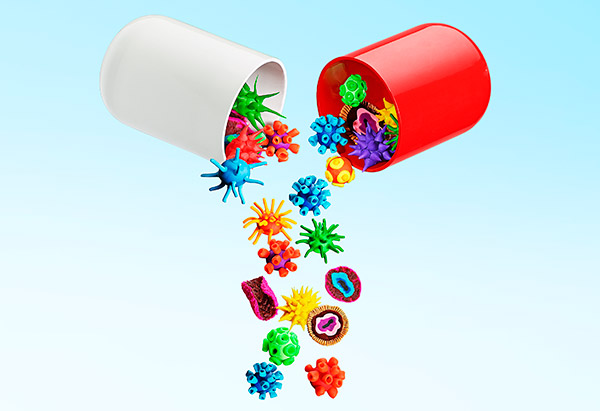A Few Good Bugs: The Surprising Health Benefits of Bacteria
Long regarded as one big ewww, bacteria are finally getting their due thanks to new research that proves bugs within us have the potential to make or break our health.

Photo: Dan Saelinger
One morning a few months ago, before the sun came up and my daughter started stirring in her crib, I locked myself in the bathroom with some latex gloves and two long-handled swabs. One of the swabs I rubbed all over the inside of my unbrushed, decidedly unminty mouth. The other—how can I put this elegantly?—I swiped across a sample of my poop. I stuck the swabs into separate one-inch vials filled with a salt solution, then dropped them into a FedEx envelope.
The DIY science kit I used was one of the first produced by uBiome, a biotech startup that sequences the bacteria living inside a person's body. Founded by two scientists and a doctoral student at Oxford, the company aims to involve everyday people in what's arguably become the hottest area of medicine: microbiome research, an emerging field that's investigating how the bacteria that live in and on our bodies affect our health. The potential for far-reaching medical change is high—what scientists find could revolutionize how we fight infection and treat or prevent everything from obesity to cancer.
Proctor directs the NIH-funded Human Microbiome Project (HMP), which last summer released the results of a five-year endeavor to identify and sequence the genetic material of all the microbes living in 242 healthy people. So far, HMP's data show that the average person plays host to more than 10,000 species of organisms, including bacteria, viruses, and fungi. All together, these make up what scientists refer to as your microbiome.
Every person's microbiome is unique—the product of their genes, the foods they eat, and the environment they're exposed to. But people who share certain physical and neurological traits also have similar microbiomes. Obese people's microbiomes look different from lean people's; kids with autism have a different type of bacteria in their guts than kids without it; folks who have eczema live with different kinds of bugs on their skin than those who don't. As more and more people have their microbiomes mapped, scientists will be able to make more and more solid connections between specific bacteria and health conditions. "We're only just beginning to understand who's in there and what they're doing," says HMP investigator Barbara Methé, PhD.
The DIY science kit I used was one of the first produced by uBiome, a biotech startup that sequences the bacteria living inside a person's body. Founded by two scientists and a doctoral student at Oxford, the company aims to involve everyday people in what's arguably become the hottest area of medicine: microbiome research, an emerging field that's investigating how the bacteria that live in and on our bodies affect our health. The potential for far-reaching medical change is high—what scientists find could revolutionize how we fight infection and treat or prevent everything from obesity to cancer.
The Benefits of Bacteria
These days you can hardly find a hand soap that doesn't tout its antibacterial properties, and Purell has taken up permanent residence in many of our purses. So it's understandable if learning that you have three to five pounds of microbes in and on your body makes you feel a bit green. "In the past we tended to think that the absence of microbes made people healthy," says microbial ecologist Lita Proctor, PhD. "But as we're learning, bacteria are not just a source of disease—they're a source of health."Proctor directs the NIH-funded Human Microbiome Project (HMP), which last summer released the results of a five-year endeavor to identify and sequence the genetic material of all the microbes living in 242 healthy people. So far, HMP's data show that the average person plays host to more than 10,000 species of organisms, including bacteria, viruses, and fungi. All together, these make up what scientists refer to as your microbiome.
Every person's microbiome is unique—the product of their genes, the foods they eat, and the environment they're exposed to. But people who share certain physical and neurological traits also have similar microbiomes. Obese people's microbiomes look different from lean people's; kids with autism have a different type of bacteria in their guts than kids without it; folks who have eczema live with different kinds of bugs on their skin than those who don't. As more and more people have their microbiomes mapped, scientists will be able to make more and more solid connections between specific bacteria and health conditions. "We're only just beginning to understand who's in there and what they're doing," says HMP investigator Barbara Methé, PhD.



